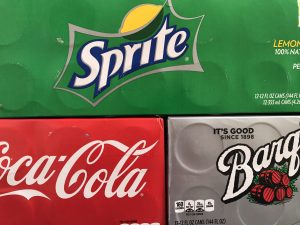Cook County soft-drink tax takes effect July 1
By Paul Sassone For Chronicle Media — May 30, 2017
A 12 pack of soda that sells for $4.99 will go up $1.44 to $6.43 (29 percent), when the Cook County soft drink tax takes effect July 1.
You still can buy the world a Coke, but in Cook County it will cost more.
That’s because the county’s soft-drink tax goes into effect July 1.
The tax will be a penny an ounce on all “sweetened beverages” that contain sugar or artificial sweeteners. This includes, soft drinks, diet soft drinks, fruit beverages that are not 100 percent fruit juice, sports drinks and energy drinks.
Thus, a two liter bottle of soda that sells for 99 cents will increase 67 cents to $1.66 (67 percent). A 12 pack of soda that sells for $4.99 will go up $1.44 to $6.43 (29 percent). And a 24 pack will go from $7.99 to $10.87 (36 percent).
The beverage tax is strongly opposed by business organizations, including the Illinois Beverage Association, which warned, “Many Cook County taxpayers have faced a massive property tax increase and new taxes on water and sewer services. Now is not the time for Illinois families to endure a tax on their groceries. Enough is enough. Nearly 9,000 jobs in restaurants, grocery stores, convenience stores and movie theaters and more rely on the industry — all of which would be hurt by the tax.”
The Cook County Board narrowly passed the tax last year, with Toni Preckwinkle, county board president, casting the deciding vote in favor.
She said that tax will bring in $75 million in revenue to the county every year. Without this money, Preckwinkle said, the county would have to increase property taxes and cut health and public safety services.
An additional benefit of the tax, she said, is that it will discourage people from buying soft drinks, which are a cause of obesity and diabetes.
But, opponents of the tax contend it is regressive, that it hurts people who can least afford to pay the additional cost, middle class and poor people.
They point to a Gallup study that showed 45 percent of people making less than $30,000 a year drink soda, as opposed to only 20 percent of those making more than $75,000 a year. People making less money are more likely to drink soda.
Then there is the situation in the city of Philadelphia.
In June of last year, Philadelphia became the first major American city to adopt a soft drink tax.
Soft drink sales in Philadelphia reportedly are down 30 to 50 percent.
Stores and beverage distributors say they will lay off workers — some as much as 20 percent of their work force — because of the slump in sales. And the American Beverage Association is suing Philadelphia to repeal the tax.
Whether the impact of a soft drink tax on Cook County residents and businesses will resemble the Philadelphia’s experience will become known starting July 1.
— Cook County soft-drink tax takes effect July 1 —







